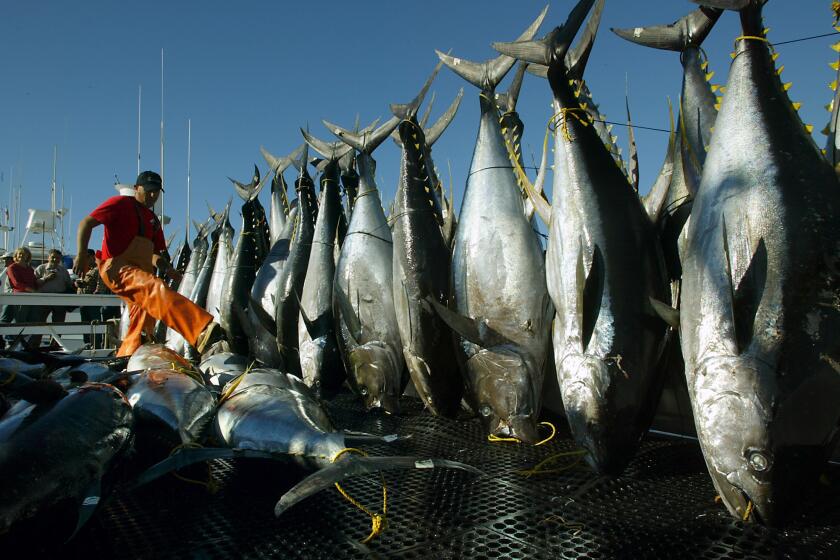Bumble Bee ex-CEO is convicted in tuna price-fixing conspiracy

- Share via
Bumble Bee Foods former Chief Executive Chris Lischewski was convicted in a price-fixing conspiracy, capping a years-long U.S. investigation that shook the packaged-seafood industry and pushed Bumble Bee into bankruptcy protection last month.
Lischewski was found guilty Tuesday by a federal jury in San Francisco after just a few hours of deliberations in what experts say is likely the final piece of the Justice Department investigation. Prosecutors alleged that Lischewski conspired with colleagues and executives at rival companies on a “peace proposal” in order to boost prices and meet earnings targets set by Bumble Bee’s 2010 sale to Lion Capital.
The former CEO faces up to 10 years in prison and a fine of $1 million, according to the indictment. His lawyer, Elliot Peters, declined to comment.
The conviction underscores the Justice Department’s “willingness and ability to try high-stakes price-fixing cases against senior corporate executives,” said Phil Giordano, a partner in the antitrust practice of Hughes Hubbard & Reed and a former federal prosecutor who is not involved in the case.
San Diego-based Bumble Bee, owner of the largest North American brand of packaged seafood, pleaded guilty in 2017 to a felony charge of conspiring with competitors Starkist Co. and Chicken of the Sea Inc. to fix and raise prices of canned tuna in the United States from 2011 through at least late 2013.
Secret meetings, whispered threats -- the price-fixing case against tuna companies sounds like a mafia story.
The company’s guilty plea carried a criminal fine of $25 million, a reduced figure that the Justice Department agreed to after Bumble Bee argued that a stiffer penalty would tip it into bankruptcy. Subsequent lawsuits filed against Bumble Bee by its customers — mostly major U.S. grocers — added to the financial pressure, leading the tuna company to file for Chapter 11 bankruptcy protection from creditors Nov. 21.
“Prosecutors don’t try to put companies out of business,” Giordano said. “But sometimes a fine by the book is in fact so substantial that it can bankrupt the company.”
Starkist pleaded guilty to the price-fixing charges in 2018 and also agreed to cooperate. Chicken of the Sea, owned by Thai Union Group, received conditional leniency from the Justice Department for its cooperation with the investigation and didn’t have to pay fines.
In the case against Lischewski, prosecutors leaned on testimony from his former subordinates, Kenneth Worsham and Walter Cameron, who in 2016 pleaded guilty to price fixing and agreed to cooperate with prosecutors.
Peters devoted much of his closing arguments to attacking the credibility of Worsham and Cameron, arguing that they fed prosecutors information that prosecutors wanted to hear in order to reduce their own sentences and fines.
Lischewski’s conviction may make him a target in class-action lawsuits against Bumble Bee and related parties, said Eric Snyder, chairman of the bankruptcy practice at Wilk Auslander, who is not involved in the case.“Given the criminal fine here, he might end up filing for personal bankruptcy,” Snyder said.
More to Read
Inside the business of entertainment
The Wide Shot brings you news, analysis and insights on everything from streaming wars to production — and what it all means for the future.
You may occasionally receive promotional content from the Los Angeles Times.











